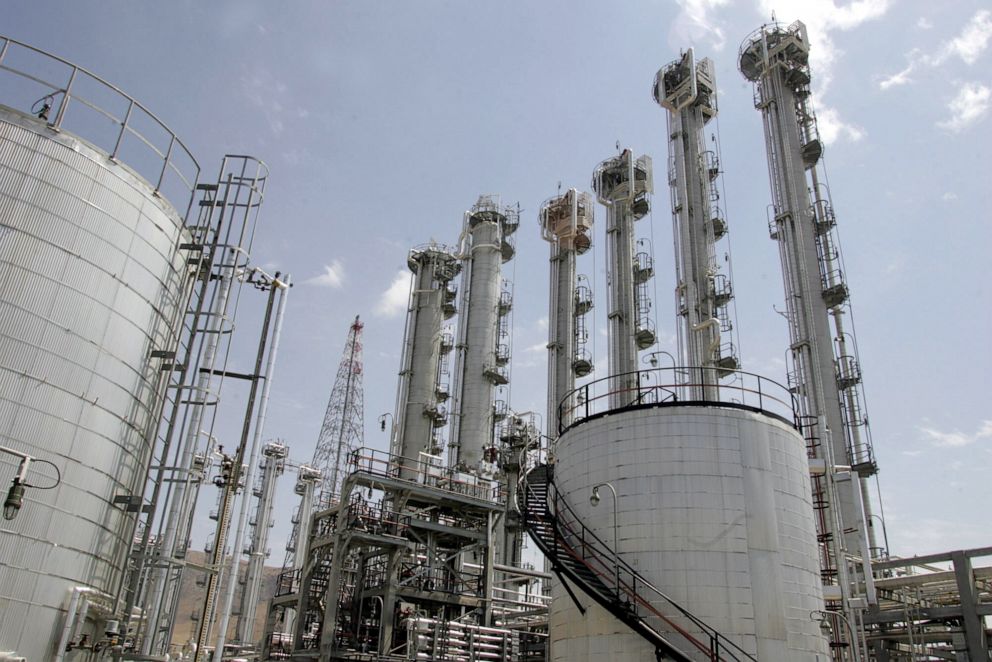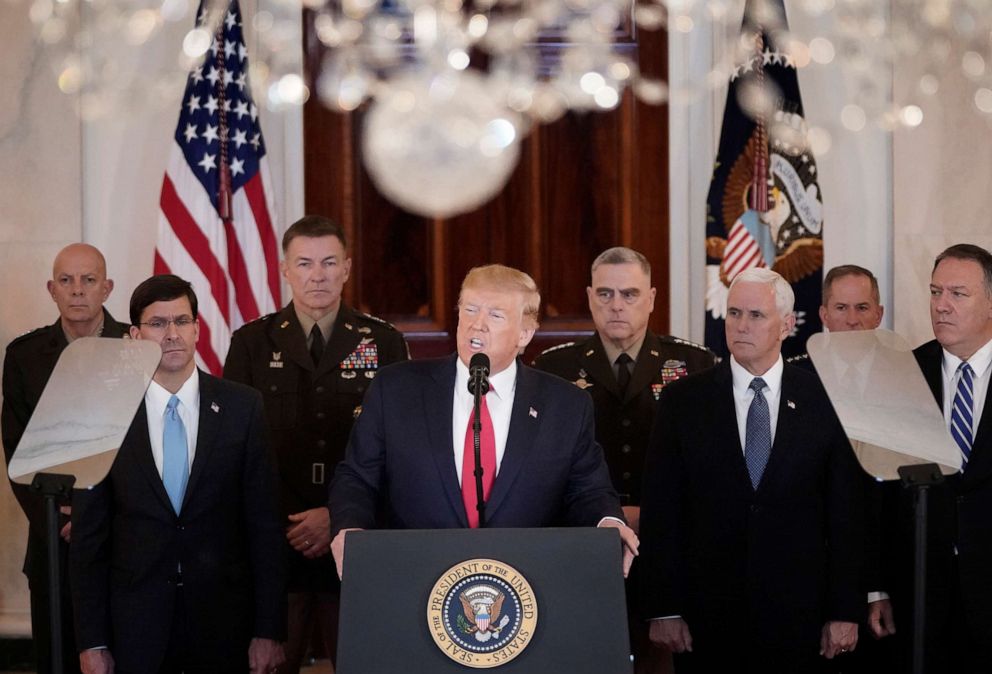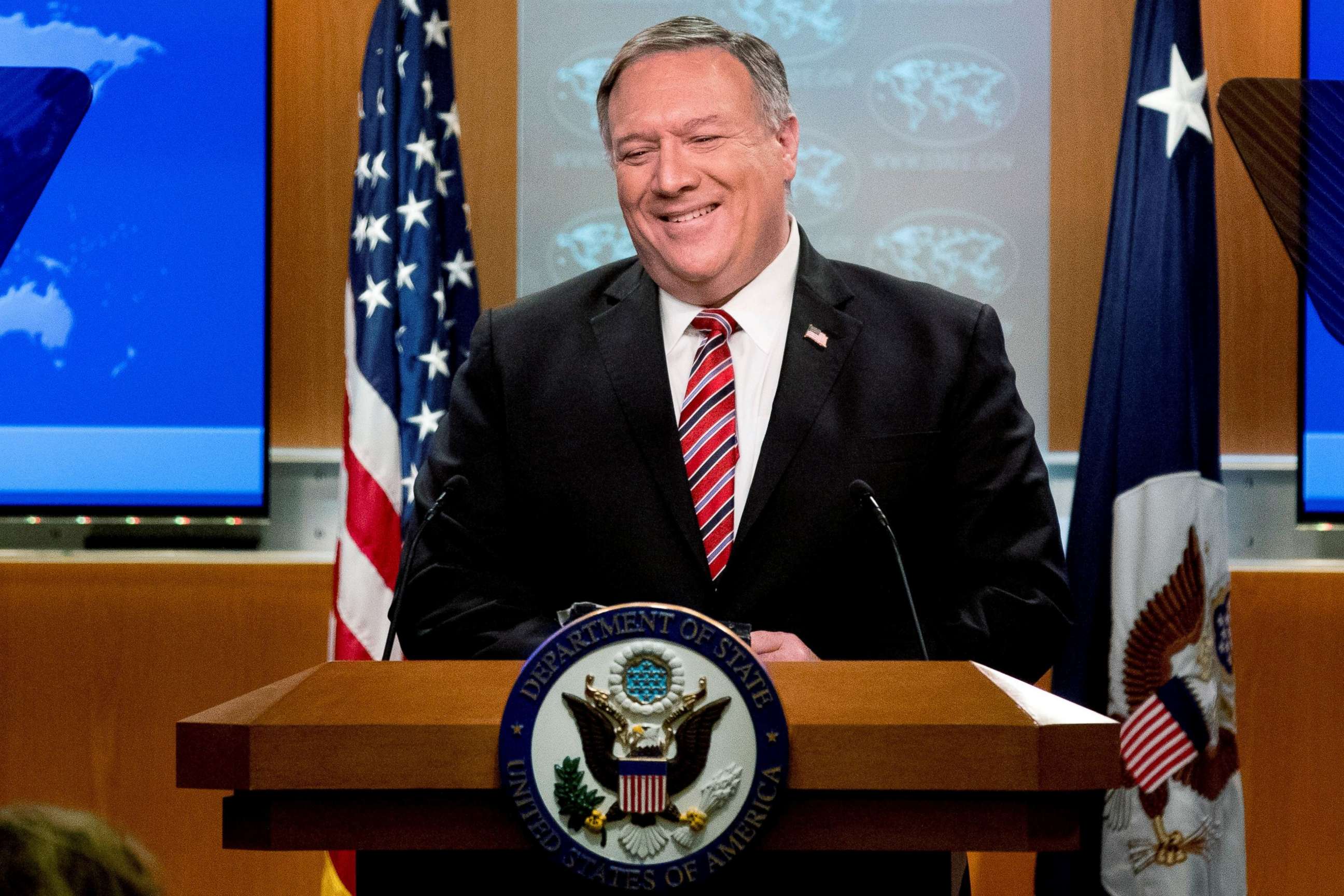Despite exit, US may use Iran nuclear deal to extend UN arms embargo on Tehran
The controversial move has sparked criticism.
The Trump administration may use the United Nations Security Council resolution that enshrined the Iran nuclear deal to effectively end the agreement -- snapping U.N. sanctions back on Tehran and extending a ban on selling it conventional weapons, according to Secretary of State Mike Pompeo and his special envoy for Iran.
The controversial move has sparked criticism that President Donald Trump is picking and choosing which parts of the deal to abide by, even after withdrawing the U.S. from it and violating America's obligations by imposing strict sanctions on Iran and its economy.
Special envoy for Iran Brian Hook said Thursday the U.S. would only move to snap back sanctions, which it has questionable legal grounds to do, if the U.N. Security Council does not vote to extend the arms embargo. But analysts fear that the action could damage the U.N.'s top body in the long run by causing a deep legal rift or extending the embargo without any enforcement from permanent members Russia and China.
Diplomats from America's European allies -- particularly France, Germany, and the United Kingdom, the three countries remaining in the deal and known as the E3 -- have quietly condemned the proposal, saying it is a disingenuous read of the deal meant to undermine it and possibly destroy it once and for all. So far, though, none of them has criticized it on the record, given the delicacy of transatlantic relations.

Formally known as the Joint Comprehensive Plan of Action, or JCPOA, the deal required Iran to abide by limits on its nuclear program and agree to inspections of its nuclear sites, in exchange for the U.N., the U.S., and others lifting certain sanctions, including embargoes on weapons sales.
One year after Trump withdrew in May 2018, Iran began breaching those limits and demanding the European signatories make up for the cost of new U.S. sanctions. The European Union developed a financial mechanism to work around the U.S., but Trump's threat of maximum enforcement has largely scared away any European businesses and dried up Iranian coffers, particularly of revenue from oil.
In response, Iran has stockpiled more enriched uranium and at higher levels since June 2019, decreasing the one-year break-out time in which it could make a nuclear weapon. While Iran says it will not pursue the bomb, its government announced in January it would no longer abide by any restraints on its nuclear program. The European Union responded by filing a complaint with the Joint Commission that oversees the deal, and talks under that "dispute resolution mechanism" continue at a technical level, according to a European diplomat.
The U.N. Security Council blessed the nuclear deal in Resolution 2231, and as part of that, the body agreed to lift a U.N. embargo on Iran purchasing or selling conventional weapons, such as tanks, attack helicopters, or certain missiles, on October 18, 2020.
"We're not going to let that happen," Secretary of State Mike Pompeo said Wednesday. "In the event that we can't get anyone else to act, the United States is evaluating every possibility about how we might do that."
Hook said the Trump administration is "very hopeful" that it can convince the Security Council to extend the embargo, with a resolution to do so already drafted and shopped around with allies and partners.

But with their veto power, Russia and China are unlikely to allow that. Both governments have already indicated they are lining up potential military sales with Iran, with which Moscow has strong ties and where China sees a commercial opportunity.
That could lead to the nuclear option -- the U.S. snapping back U.N. sanctions on its own. The JCPOA lays out a path where any signatory can do so if the other side is in violation of its commitments, as both the U.S. and Iran now are.
But what makes this move controversial is that the U.S. has declared it's no longer a party to the deal. Instead, Hook said, the U.S. remains a party to the U.N. resolution because its name is explicitly listed in the resolution's paragraph 10, instead of only authorizing remaining signatories to snap sanctions back.
"It's just there in the language. There's nothing magic about this. Someone suggested it's fancy lawyering -- it's just readin'," Pompeo told reporters Wednesday.
Some experts have questioned that logic, pointing out paragraph 10 "encourages" those listed member states "to resolve any issues" through the deal itself, which the U.S. can no longer do. That was the source of a Twitter spat between Pompeo and Sen. Elizabeth Warren, D-Mass., on Thursday, who tweeted, "That makes no sense. Make up your mind, @SecPompeo."
U.S. allies also see it as a dangerous move because of the chaos it would cause, with Russia and China, and other U.N. member states challenging the United States's legal right to do so.
"This would be incredibly messy. You'd have a lot of argument among the Security Council on legal interpretations and the real nervousness of that precedent setting a real divide among U.N. members," the European diplomat told ABC News.

Beyond that legal battle, the move would also distract from the goal shared among Western allies, the diplomat said -- to focus on and push back against Iran's "malign behavior."
"It very much puts the onus of responsibility and blame back at the U.S.'s doorstep, as opposed to Iran's doorstep. At the end of the day, we want the focus to be and the conversation to be about Iranian malign behavior, not about U.S. unilateralism," they added.
France is "deeply committed to respecting" the original U.N. resolution, its foreign ministry spokesperson said Wednesday in a diplomatic swipe at the Trump administration. But the spokesperson noted the French government's concern about the embargo lifting entirely.
There could be some middle ground there, according to European officials, where even Russia and China agree to some continued weapons restrictions for Iran, but Iran still gets this particular U.N. embargo lifted as it was promised under the deal. But it's unclear whether the U.S., with its "maximum pressure" campaign, would agree to that or if this threat of U.N. sanctions snap back is a negotiating tactic.
"It is clearly part of that 'Art of the Deal' tactic of increasing pressure. The difficulty is you increase the pressure on the E3 rather than on Russia and China and you risk politicizing this before we've actually had some conversations with the audiences that we're going to need to win over in order to deliver," the European diplomat said. "If this drum beating continues loudly, that limits the space we have available."




